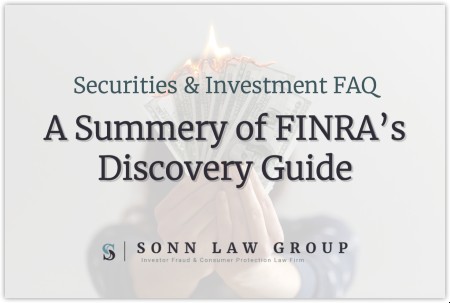Understanding FINRA Discovery Rules
Discovery is the foundation of every successful legal case. As explained most simply by the American Bar Association (ABA), discovery is the formal process by which parties to a legal claim are required to exchange information. To ensure that a case proceeds fairly, parties are required to turn over many documents and records that are relevant to the case at hand.
For cases governed by the Financial Industry Regulatory Authority (FINRA), the self-governing organization’s official discovery rules will control the dispute. Here, our experienced securities fraud lawyers explain what you need to know about FINRA’s discovery process.
Discovery Works in Both Directions
 FINRA’s discovery rules put a legal obligation to produce certain relevant information and documents on all parties to the arbitration proceeding.
FINRA’s discovery rules put a legal obligation to produce certain relevant information and documents on all parties to the arbitration proceeding.
For investment fraud victims, this is very important because it allows them to seek much needed financial records from brokers and broker-dealers.
Sadly, all too often, members of the securities industry often try to hold back this information.
At the same time, investment fraud victims must understand that they will also be required to produce certain documents during this process.
Indeed, in some cases, the defendant, whether an individual broker or a brokerage firm, will aggressively seek extensive information. The failure by a customer to produce these records could have adverse consequences.
FINRA Discovery Has Limits
In FINRA arbitration cases, discovery is far more limited than it is most other traditional types of cases. In fact, unlike other types of litigation, there are generally no depositions in these types of cases. While there are some exceptions to this guideline, which can be found under FINRA Rule 12510, most FINRA arbitration discovery is limited to records and documents.
Certain Documents are Presumptively Discoverable
In regards to FINRA arbitration claims, there are many documents that are presumed to be ‘discoverable’. This means that there is an assumption that all of these documents should be produced, unless good cause can be shown to prove otherwise. There are many documents and records that both customers and brokerage firms are expected to produce:
Brokerage Firms Should Produce
- Customer account records, including all documents pertaining to the customer’s risk profile;
- Copies of all letters and correspondence sent or received by any representatives of the firm;
- Documents that explain any trading strategies that were used on the customer’s account;
- All documents and any materials pertaining to trading authorizations made by the customer;
- Confirmation records for any transactions that were made;
- Any notations made by brokers that refer to industry compliance issues;
- Copies of any recordings between the customer and broker that were made;
- Internal audits related to the customer’s account; and
- All records of past disciplinary action taken by the firm that might be relevant in the proceedings.
Complaining Customers Should Produce
- Copies of the customer’s federal income tax returns;
- Financial statements covering the previous three years of all transactions that are at issue in the dispute;
- All documents that the customer received from their broker or brokerage firm, unless those documents were used in the ‘ordinary course of business’;
- Notes that the customer made, including diaries and calendars, related to their account;
- All agreements that the customer signed;
- Other important records.
What Happens If a Party Fails to Produce Documents?
In the event that one of the parties, either the customer or the brokerage firm, fails to produce any documents that are required under the discovery order, then the arbitrator in the case has the ability to issue sanctions. The sanctions against the noncomplying party can be substantial. For example, these sanctions could include:
- Immediate financial penalties;
- An order for attorneys’ fees;
- Striking certain evidence from the proceeding;
- Drawing an adverse inference against the noncomplying party;
- Dismissing the claim; and/or
- Ruling against the broker-dealer.
You Need to Take Action
If you were the victim of securities fraud, and now you are pursuing legal action, or you are considering taking action, it is imperative that you get an attorney involved in your case as soon possible. Your attorney will be able to ensure that you get the discovery process done the right way.
This means making sure that the brokerage firm turns over every document and record that they have in their possession, and that might be in any way relevant to your claim. Additionally, it also includes ensuring that you are able to gather and turn over all documents and records that you have required to by the discovery order. If you fail to turn over important documents, it could severely damage your claim.
Contact Our Attorneys Today
Do you need help navigating FINRA discovery rules? At the Sonn Law Group, our team has extensive experience handling FINRA arbitration cases. For assistance with your case, please call our team today at 844-689-5754. We represent investors in South Florida and throughout the United States.
CONTACT US FOR A FREE CONSULTATION
Se Habla Español
Contact our office today to discuss your case. You can reach us by phone at 844-689-5754 or via e-mail. To send us an e-mail, simply complete and submit the online form below.

